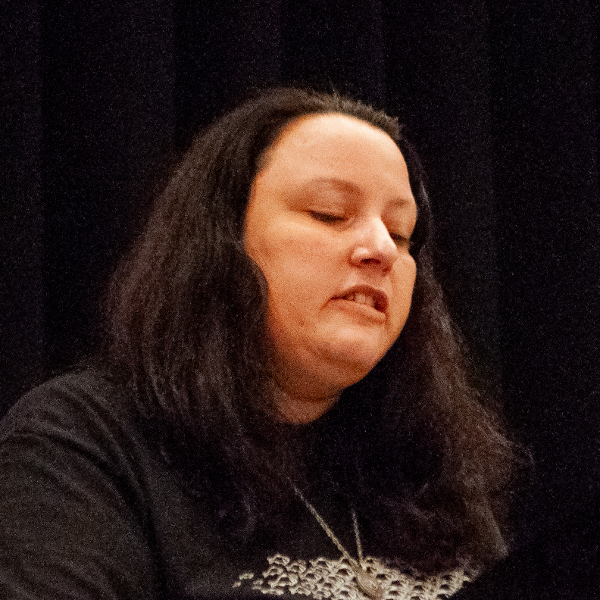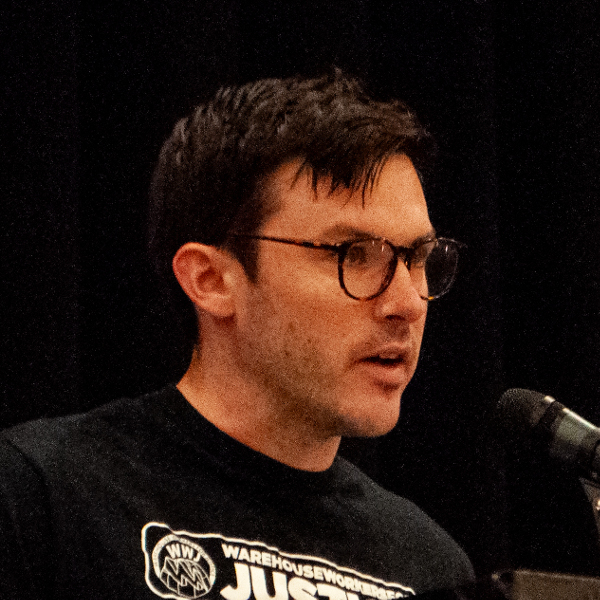From UE News | Photos Courtesy of ueunion.org | UE News Reuse Policy
On Thursday the final day of UE’s 78th convention, delegates heard remarks from Molly Greenberg of the Moving Forward Network and Tommy Carden of Warehouse Workers for Justice.

Above: Molly Greenberg, Moving Forward Network. Below: Tommy Carden, Warehouse Workers for Justice.
Greenberg said the Moving Forward Network brings together organizations representing two million people who live in or near rail yards, which she called “some of the most toxic facilities in the freight rail system.” She detailed the negative health benefits from railroads’ pollution, and declared that “There is no reason why our communities must suffer,” given that the technology exists to eliminate diesel emissions in rail yards.
Greenberg gave the Senate hearing in July where UE General President Carl Rosen testified, along with a representative of the network, as an example of the power of workers and communities working together. “The fact that UE and the Moving Forward Network were saying very similar things and supporting each other” made a “usually unflappable” representative of the railroad industry nervous, she said.
Carden described the abysmal working and living conditions of logistics industry workers in Illinois. “Logistics companies and railroads are some of the most profitable companies in the world,” he said, “and they are getting away with murder.” With their profits, they could easily afford to pay their workers well and invest in solutions to the pollution created by their industry, but they “will not simply do so out of the goodness of their hearts — they need to be forced to do so.”
Following the speakers’ remarks, Scott Slawson, Local 506, spoke in agreement. “There is no reason we cannot be adopting battery technology in rail yards now,” he said. Local 506 members build locomotives, including the battery-powered FLX Drive.
“A murderous system”
Speaking on the resolution “Medicare for All,” both Dawn Meyer, Local 808, and Ashley Clemons, Local 1004, shared stories of having lost loved ones to the cost of healthcare. Meyer’s husband refused to go to the doctor after medical debt from a previous health problem caused them to lose their home years previously. Clemons lost her mother due to her inability to secure health insurance coverage. “You shouldn’t have to die because people want to line their pockets,” Clemons declared.
Other delegates offered further testimony on what General President Carl Rosen called “a murderous system.” Theresa Sochanchak, Local 119, said “Our health insurance that we have for our job is a joke.” Their plan is literally called “minimal essential coverage” but, she said, it “doesn’t cover much of anything.” Fred Hatef, Local 1008, pointed out that the real issue with healthcare policy, like in many of the other social questions addressed in other resolutions, is “Whether or not we’re going to choose people or we’re going to choose money and profits.” Hatef said, “I think we should choose people in every situation.”
Speaking on the resolution, “For Peace, Jobs, and a Pro-Worker Foreign Policy,” Mike Giles, Local 506, said that the threat of war with Russia “scares the living hell out of me.” Ramona Malczynski, Local 1466, noted that most of the mainstream media only say “what the war-mongers want them to say” and urged other UE members to “look at independent media, read multiple news sources.” She noted that the U.S. has 750 military bases across the world in 80 other countries, and said “Let’s solve the problems here before we go into other countries.”
Dhananja Dassanaike, Local 1004, also rose in support of the resolution, especially its mention of the brutal situation faced by the Palestinian people. Dassanaike described some of those conditions in more detail: denial of healthcare, pregnant women having to give birth while being detained at checkpoints, Palestinian children being run over by Israeli state security forces, and Palestinian homes being appropriated by Israeli settlers. He supports the resolution, he said, in the hope that one day, “from the river to the sea, Palestine will be free.”
The UE Difference
The final resolution considered by the convention, “Aggressive Struggle,” inspired several delegates to speak about how UE’s rank-and-file nature makes it different from other unions. Scott Slawson, Local 506, began discussion by saying, “I hope people understand the importance of this resolution and the democracy of our union. This is the model this union was founded on, this is our very democracy.”
Western Region President Bryan Martindale cautioned delegates against not only depending too much on union staff, but depending too much on a small group of officers. “Always look at your members to make decisions,” he urged.
Antwon Gibson, Local 610, related a story his father told him. The local union that his father belonged to, in an AFL-CIO union, voted on their contract but the national union overturned the local’s decision. “The UE is a lot different,” said Gibson. “The rank and file members run this union. I want you all to know that’s the UE difference.”
The convention concluded with delegates singing “Solidarity Forever.”

